The Great Outdoors
At EPA, we protect human health and the environment so you can live a healthy life, but also so you can enjoy the landscapes our nation has to offer.
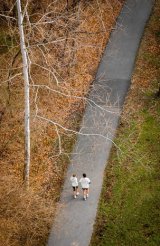
Did you know spending time outdoors is good for us?
Exposure to green space in cities and suburbs is associated with a host of health benefits such as improved mental health, better pregnancy outcomes, and reduced cardiovascular disease and mortality. But how does spending time in green natural environments lead to better health? One explanation may be reducing the harmful effects of chronic stress. EPA scientists have now drawn a correlation between the amount of green space near homes and chronic stress reduction—the latter of which is thought to be among an interacting set of mechanisms that can improve our health.
There is so much to appreciate in the natural environment - across the country or just outside your door. Discover ways to help you stay safe and make the most of your time outdoors below!
Protect yourself outdoors
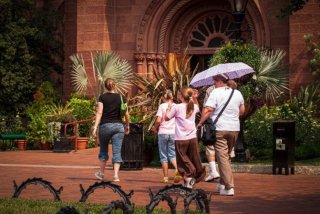
Avoid overexposure to UV rays.
- Check the UV Index to find days when you want to avoid overexposure to damaging sun ultraviolet rays.
- Protect yourself when spending time in sun by seeking shade, and using sunblock that has a protection level of at least SPF 15.
Know your air quality
- Check the Air Quality Index so you can plan when to limit or avoid working or playing outdoors on days with poor air quality.
- Kids! Learn more about air quality with Coco.
Check the water quality near your local beach
- Contact the state office where your beach is located for any water quality advisories.
- If you go fishing, check state reports regarding specific fish species in certain streams, rivers, or lakes before you consume your catch.
Protect Your Family from Mosquitoes
- Don’t let mosquitoes ruin your time outdoors! Mosquito bites can cause skin irritation and transmit diseases. Controlling mosquitoes effectively requires a comprehensive approach that has been scientifically tested and proven. Learn about integrated pest management methods for mosquitoes.
Vacations
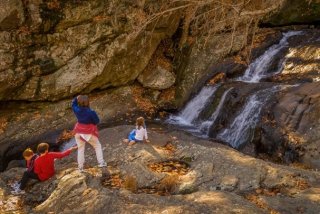
Visit a National Park for free!
All fourth graders, or age equivalent, are eligible to receive an Every Kid Outdoors pass, which is valid at more than 2,000 federally managed lands and water sites across the country between September 1 and August 31 each year. Learn more about the Every Kid Outdoors program.
Reduce waste on your vacation
Here are some tips for when you leave home and when you are on the road.
- When vacationing, take everything you bring in when you leave, so that you leave places undisturbed and without litter. Remember that the most effective way to reduce waste is to not create it in the first place. Focus on reducing your waste.
- Bring scrap paper for drawing and games to pass the time on long drives or rainy vacation days.
- Pack your reusable bottles, bags, and cutlery.
- When you’re on vacation, find out how to recycle wherever you are. Is there curbside recycling at the home you’ve rented or a centralized recycling location at the campsite? If not, find a recycling location near you through one of these searches*:
Discover more recycling and waste tips for travel.
*Disclaimer: These sites are listed for informational purposes only. U.S. EPA does not endorse these entities or their services.
Be wise with fire
If you’re camping and building a campfire, make sure to follow best wood-burning practices.
Staycations
Create the great outdoors in your yard!
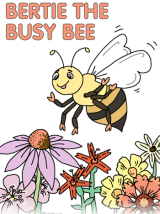
Not everyone gets to spend their summer vacation in a hammock... follow these tips to make the most of your lawn and garden.
- Raise the cutting height of your lawnmower during hot summer months to keep grass roots shaded and cooler, reducing weed growth, browning, and the need for watering.
- If you need large lawn and garden equipment such as tillers and chainsaws, you can reduce waste (and save money) through sharing with your neighbors.
- When you mow the “grasscycle” way, you leave grass clippings on your lawn instead of bagging them. The clippings return nutrients to the soil instead of taking up space in landfills.
Kids! Protect pollinators in your yard. Learn how with Bertie the Busy Bee (pdf).
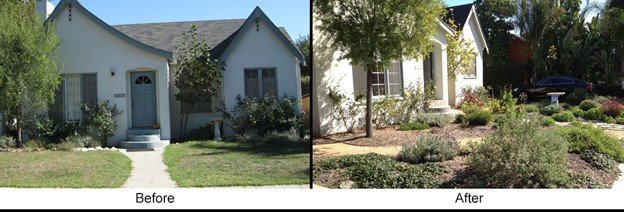
Learn to compost at home.
Use food scraps, yard trimmings, and other organic wastes to create a compost pile. Adding the compost you make to soil increases water retention, decreases erosion, and keeps organic materials out of landfills. Learn how to compost at home.
Kids! Learn how to reduce food waste with our activity book and explore Recycle City!
Clean up using safer ingredients for people and waterways.
Find EPA Safer Choice-certified cleaning products for grill, deck, car and boat cleaners as well as other poducts used outdoors.
Kids! Rainy day?
- Add color to your world with our activity book and coloring pages. How Does EPA Protect the Environment? Activity Book (pdf)
